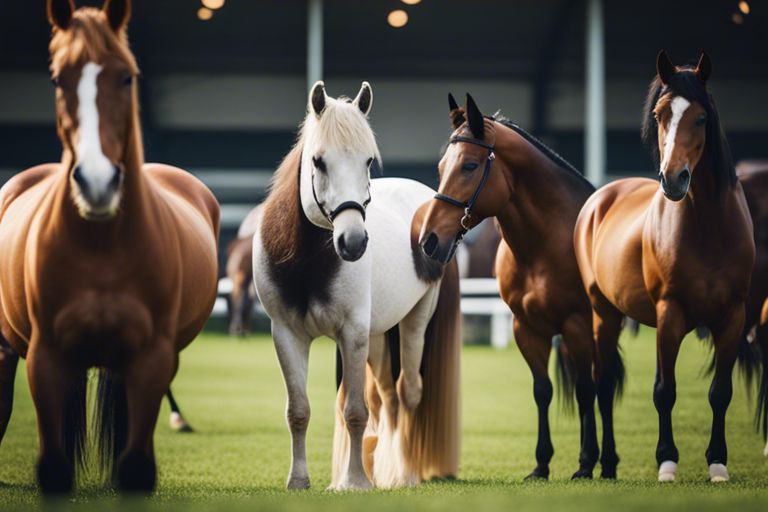Dear readers, in the grand world of Equestrian pursuits, ponies play a vital role. These delightful creatures are not just adorable companions; they are also capable athletes in their own right, excelling in various disciplines such as dressage, show jumping, and eventing. Your partnership with a pony can be immensely rewarding, but it is vital to remember that despite their size, ponies possess great strength and agility. Proper training and care are crucial to ensure your safety and success in the thrilling realm of Equestrian sports.

Historical Significance
Origins of Pony Involvement
One cannot deny the historical significance of ponies in equestrian sports. These remarkable creatures have been instrumental in the development and success of various disciplines, including show jumping, dressage, and eventing. Your journey into the world of equestrian sports would not be complete without acknowledging the integral role that ponies have played throughout history.
Development of Pony Breeds
With their smaller stature and remarkable agility, ponies have been selectively bred over centuries to excel in specific equestrian disciplines. In the 18th and 19th centuries, various pony breeds were developed, each with unique characteristics suited to different sports. Breeds such as the Welsh Pony, Connemara Pony, and Shetland Pony have left a lasting legacy in the equestrian world, contributing to the success of riders and drivers alike.
Involvement of ponies in equestrian sports has not only enhanced the competitive landscape but also added a touch of grace and beauty to the events. Their agility and stamina make them ideal partners for riders of all ages and skill levels, bringing a sense of joy and excitement to the world of horse sports.
Pony Characteristics
Physical Attributes
For ponies, their small size is one of their most defining physical attributes. Typically standing under 14.2 hands high, ponies are sturdy and strong, able to carry adult riders despite their diminutive stature. Their thick coats and hardy hooves make them well-suited for various terrains and weather conditions.
Temperament and Trainability
For pony enthusiasts, their temperament and trainability are key factors in their popularity. Ponies are often described as intelligent, friendly, and eager to please. Their strong work ethic and affectionate nature make them beloved companions and reliable partners in various equestrian disciplines.
Physical attributes such as their athleticism and maneuverability contribute to their success in disciplines like show jumping, dressage, and driving. Their hardiness and adaptability also make them excellent choices for riders of all ages and skill levels.
Disciplines and Events
Show Jumping and Dressage
All eyes are on you as you enter the arena for the show jumping or dressage event. Show your grace and skill as you guide your pony through a series of jumps or intricate movements. In show jumping, the objective is to clear a course of obstacles without knocking down any rails. Dressage, on the other hand, focuses on the precision and elegance of movements such as trotting, cantering, and pirouettes. Both disciplines require a strong bond between you and your pony as you work together to achieve a harmonious performance.
Eventing and Cross-Country
Any equestrian enthusiast knows the thrill of eventing, where you and your pony showcase your versatility across three phases: dressage, show jumping, and cross-country. For instance, in cross-country, you gallop over varied terrain, tackling challenging obstacles like water jumps and ditches. It’s a test of courage, agility, and trust between you and your pony.
For instance, the cross-country phase in eventing can be dangerous, requiring quick thinking and bold riding as you navigate through the course. However, the exhilaration of crossing the finish line successfully makes all the effort worthwhile.
Pony Racing and Gymkhana
To add a dash of speed and excitement to your equestrian endeavors, consider pony racing or gymkhana events. In pony racing, you and your pony sprint around a track, competing against others in a thrilling display of speed and agility. With gymkhana, you showcase your pony’s skills in various games and races, testing your teamwork and horsemanship abilities in a fun and challenging environment.
With their fast-paced nature and exciting competitions, pony racing and gymkhana events offer a unique way to bond with your pony while honing your riding skills in a competitive setting.

Training and Care
Nutrition and Health
On your journey of training and caring for your pony, nutrition and health are crucial aspects to consider. Ensuring proper nutrition with a balanced diet rich in hay, grains, and supplements is vital for your pony’s overall health and performance. Additionally, regular veterinary check-ups, vaccinations, and deworming are necessary to keep your pony healthy and happy.
Grooming and Handling
Nutrition plays a significant role in the health and performance of your pony, but so does grooming and handling. Regular grooming not only keeps your pony looking neat and tidy but also helps prevent skin issues and infections. Proper handling, such as correctly fitting saddles and bridles and using proper techniques while riding or leading your pony, is crucial for their comfort and well-being.
The bond you create with your pony through grooming and handling is invaluable. Taking the time to brush, bathe, and bond with your pony strengthens your relationship and builds trust between the two of you.
Exercise and Conditioning
The exercise and conditioning regimen for your pony is a key component of their training and care. Regular exercise helps keep your pony fit, improves their muscle tone, and enhances their performance in equestrian sports. Varying your pony’s workout routine with activities such as trail riding, jumping, and dressage can keep them engaged and motivated.
For instance, incorporating interval training into your pony’s exercise routine can improve their cardiovascular fitness and endurance, vital for competitions. Balancing exercise and rest is crucial to prevent overexertion and injuries, ensuring your pony stays healthy and happy.

Pony-Rider Partnerships
For equestrians, pony-rider partnerships are the heart of success in any equestrian discipline. The relationship between a pony and their rider is built on trust, communication, and mutual respect. This partnership is necessary for achieving harmony and executing flawless performances in competitions.
Building Trust and Communication
Partnerships between ponies and riders are formed through consistent training, communication, and understanding. Trust is the foundation of this relationship, and it is crucial for you to develop a strong bond with your pony. Effective communication, both verbal and non-verbal, is key in building trust and ensuring a successful partnership. Your pony must trust your cues and signals, and you must rely on their responsiveness and cooperation.
Developing a Strong Bond
Any successful pony-rider partnership requires time, patience, and dedication to develop a strong bond. Spending time with your pony outside of training sessions, grooming them, hand-walking, or simply bonding in the pasture, can strengthen your connection. Understanding your pony’s personality, preferences, and behavior will help foster a deeper bond and enhance your communication in the saddle. Additionally, engaging in activities that both you and your pony enjoy can create positive experiences and strengthen your partnership.
Plus, creating a strong bond with your pony can lead to improved performance, agility, and overall success in equestrian sports. A deep connection with your pony can also enhance your mutual trust, making your partnership more resilient and adaptable in various situations. By investing time and effort into nurturing your relationship with your pony, you are laying the foundation for a successful and fulfilling equestrian journey.

Competitive Pony Sports
Now, pony sports are not just limited to casual riding; they also encompass a competitive realm that showcases the skills and talents of both ponies and riders. In international competitions, pony sports take center stage, with events like show jumping, dressage, and eventing drawing top riders and their ponies from around the world.
International Competitions
An example of an international competition for ponies is the prestigious FEI Pony European Championships, where young riders compete in various disciplines. These events are not only a display of skill and precision, but they also highlight the dedication and bond between ponies and their riders. Competing in international events like these requires hard work and perseverance to reach the top levels of equestrian sports.
National and Local Events
The local and national events also play a crucial role in the world of competitive pony sports. These events provide a platform for aspiring riders and their ponies to showcase their talents and progress in the sport. Local competitions range from small shows to larger events, allowing pony enthusiasts of all levels to participate and enjoy the thrill of competition.
The competition at the national level is fierce, with riders and ponies competing for top honors in various disciplines. Success at these events can open doors to higher levels of competition, leading to opportunities at the international stage. National and local events not only foster a sense of community among pony enthusiasts but also serve as training grounds for future equestrian stars.
Pony Clubs and Organizations
One of the cornerstones of competitive pony sports are the pony clubs and organizations that cater to riders of all ages and skill levels. These clubs offer training, clinics, and competitions designed to nurture the talent of both ponies and riders. They also provide a supportive environment where individuals can learn and grow in their equestrian pursuits.
This network of clubs and organizations forms the backbone of the pony sports community, fostering friendships and mentorship among individuals who share a passion for ponies and riding. Whether you are a beginner looking to start your equestrian journey or an experienced competitor aiming for the top, these clubs and organizations provide the resources and guidance needed to succeed in the world of competitive pony sports.
Summing up
Hence, the role of ponies in equestrian sports is not to be underestimated. Ponies not only provide a stepping stone for young riders to hone their skills but also play a crucial role in various equestrian disciplines such as show jumping and dressage. Their gentle disposition and manageable size make ponies the perfect partner for riders of all ages and abilities, offering a rewarding experience for both horse and rider.
Q: What role do ponies play in equestrian sports?
A: Ponies play a vital role in equestrian sports, often being used for children or smaller adults in events such as show jumping, dressage, and eventing.
Q: What are the advantages of using ponies in equestrian sports?
A: Ponies are known for their agility, sure-footedness, and strong bond with their riders, making them perfect partners for younger or less experienced riders learning the ropes of equestrian sports.
Q: Are there specific pony breeds that excel in equestrian sports?
A: Yes, certain pony breeds like Welsh, Connemara, and New Forest ponies are popular choices for equestrian sports due to their athleticism, temperament, and suitability for various disciplines.
Q: How are ponies trained for equestrian sports?
A: Ponies are typically trained similarly to horses, with a focus on building trust, obedience, and skill in the specific discipline they will be competing in. They undergo regular exercise, schooling, and conditioning to perform at their best.
Q: Do ponies compete alongside horses in equestrian sports?
A: Yes, ponies often compete in the same events as horses, with separate categories based on size and sometimes breed. They showcase their abilities and skills alongside their larger counterparts, demonstrating that size is not a limitation in equestrian sports.










